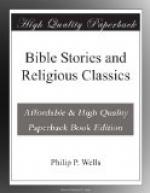And then they went into the great hothouse of Death, where flowers and trees were growing marvellously intertwined. There stood the fine hyacinths under glass bells, some quite fresh, others somewhat sickly; water snakes were twining about them, and black crabs clung tightly to the stalks. There stood gallant palm-trees, oaks, and plantains, and parsley and blooming thyme. Each tree and flower had its name; each was a human life: the people were still alive, one in China, another in Greenland, scattered about in the world. There were great trees thrust into little pots, so that they stood quite crowded, and were nearly bursting the pots; there was also many a little weakly flower in rich earth, with moss round about it, cared for and tended. But the sorrowful mother bent down over all the smallest plants, and heard the human heart beating in each, and out of millions she recognized that of her child.
“That is it!” she cried, and stretched out her hands over a little crocus flower, which hung down quite sick and pale.
“Do not touch the flower,” said the old dame; “but place yourself here; and when Death comes—I expect him every minute—then don’t let him pull up the plant, but threaten him that you will do the same to the other plants; then he’ll be frightened. He has to account for them all; not one may be pulled up till he receives commission from Heaven.”
And all at once there was an icy cold rush through the hall, and the blind mother felt that Death was arriving.
“How did you find your way hither?” said he. “How have you been able to come quicker than I?”
“I am a mother,” she answered.
And Death stretched out his long hands toward the little delicate flower; but she kept her hands tight about it, and held it fast; and yet she was full of anxious care lest he should touch one of the leaves. Then Death breathed upon her hands, and she felt that his breath was colder than the icy wind; and her hands sank down powerless.
“You can do nothing against me,” said Death.
“But the merciful God can,” she replied.
“I only do what He commands,” said Death. “I am his gardener. I take all his trees and flowers, and transplant them into the great Paradise gardens, in the unknown land. But how they will flourish there, and how it is there, I may not tell you.”
“Give me back my child,” said the mother; and she implored and wept. All at once she grasped two pretty flowers with her two hands, and called to Death, “I’ll tear off all your flowers, for I am in despair.”
“Do not touch them,” said Death. “You say you are so unhappy, and now you would make another mother just as unhappy!”
“Another mother?” said the poor woman; and she let the flowers go.
“There are your eyes for you,” said Death. “I have fished them up out of the Lake; they gleamed up quite brightly. I did not know that they were yours. Take them back—they are clearer now than before—and then look down into the deep well close by. I will tell you the names of the two flowers you wanted to pull up, and you will see what you were about to frustrate and destroy.”




